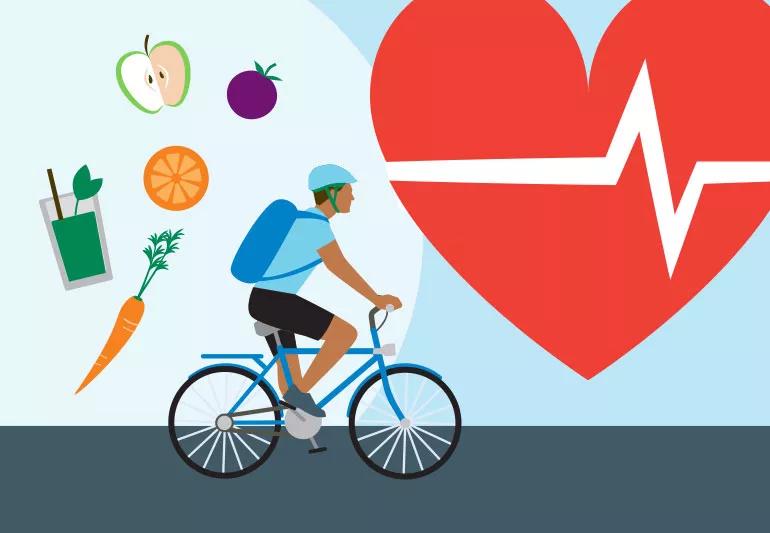Making healthy lifestyle changes ahead of surgery can help you avoid AFib after

Image content: This image is available to view online.
View image online (https://assets.clevelandclinic.org/transform/91b88381-7a00-469f-b76b-9555be1140fa/exercise-Eat-Healthy-heart-1208604845-770x533-1_jpg)
Biker in foreground with healthy food in air behind him, cycling towards a healthy heartbeat.
Days into recovery from heart surgery, an odd feeling may hit your chest. Your once steady heartbeat — lub-dub, lub-dub, lub-dub — might suddenly switch to the chaotic rhythm of an elementary school band.
Advertisement
Cleveland Clinic is a non-profit academic medical center. Advertising on our site helps support our mission. We do not endorse non-Cleveland Clinic products or services. Policy
This erratic and irregular heartbeat is called atrial fibrillation, or AFib. It’s a common and frightening symptom affecting up to 55% of patients after cardiac surgery, according to some estimates.
So, is there a way to reduce your risk of developing AFib and the complications that can come with it? Let’s look at options with cardiothoracic surgeon Edward Soltesz, MD.
It’s believed that inflammation in the chest following heart surgery contributes to AFib within a week after the procedure, says Dr. Soltesz. But the exact trigger for AFib remains unclear.
AFib is basically a malfunction of your heart’s electrical system, which powers the steady contractions that pump blood through your body. Most people’s heart rates are between 60 and 100 beats per minute. But AFib brings a series of rapid, chaotic pulses that upset your heart’s rhythm and drive it higher or lower. When this happens, your heart doesn’t contract effectively — which means blood isn’t squeezed out properly.
Some cases of AFib can be mild enough to go unnoticed. More severe cases of AFib, however, can lead to fatigue, chest pains (angina) and what’s described as a “feeling of butterflies” in your chest.
“Prevent” may be too strong a word regarding your ability to ward off the development of AFib, but here are four steps you can take ahead of heart surgery to reduce your risk, according to Dr. Soltesz:
Advertisement
If you get AFib, various treatments and medications are available to help get your heart back into its proper rhythm.
Regaining control is important. Untreated AFib can increase your risk of blood clots and stroke. (Fast fact: AFib causes about 1 in 7 strokes, according to the U.S. Centers for Disease Control and Prevention.)
Over time, AFib can weaken your heart and open the door to heartfailure.
“AFib can occur sporadically or persistently — and if it happens once, it’s more likely to happen again,” states Dr. Soltesz. “Talk to your physician before and after surgery about your potential risks and what you can do to decrease them.”
Advertisement

Sign up for our Health Essentials emails for expert guidance on nutrition, fitness, sleep, skin care and more.
Learn more about our editorial process.
Advertisement
Opt for plant-based foods and consider limiting alcohol and caffeine
Having atrial fibrillation increases your risk of stroke — but blood thinners can help for many people
The short answer from a cardiovascular researcher
Knowing the facts can make all the difference
Recovery takes about 12 weeks, but you’ll likely feel a lot better by six weeks after surgery
Your scar will heal best if you keep the area clean, dry and covered for an appropriate amount of time
Fainting, heart palpitations and shortness of breath are just a few signs your heart may need help
Keep the area clean and monitor your incision site for discharge, odor or a change in appearance
Prioritize your health by managing stress, strengthening your social connections and getting quality sleep
Bolsters, blankets, pillows and blocks can offer extra support, stability and comfort
Allergies, postnasal drip, asthma or reflux could be to blame for a cough that won’t quit